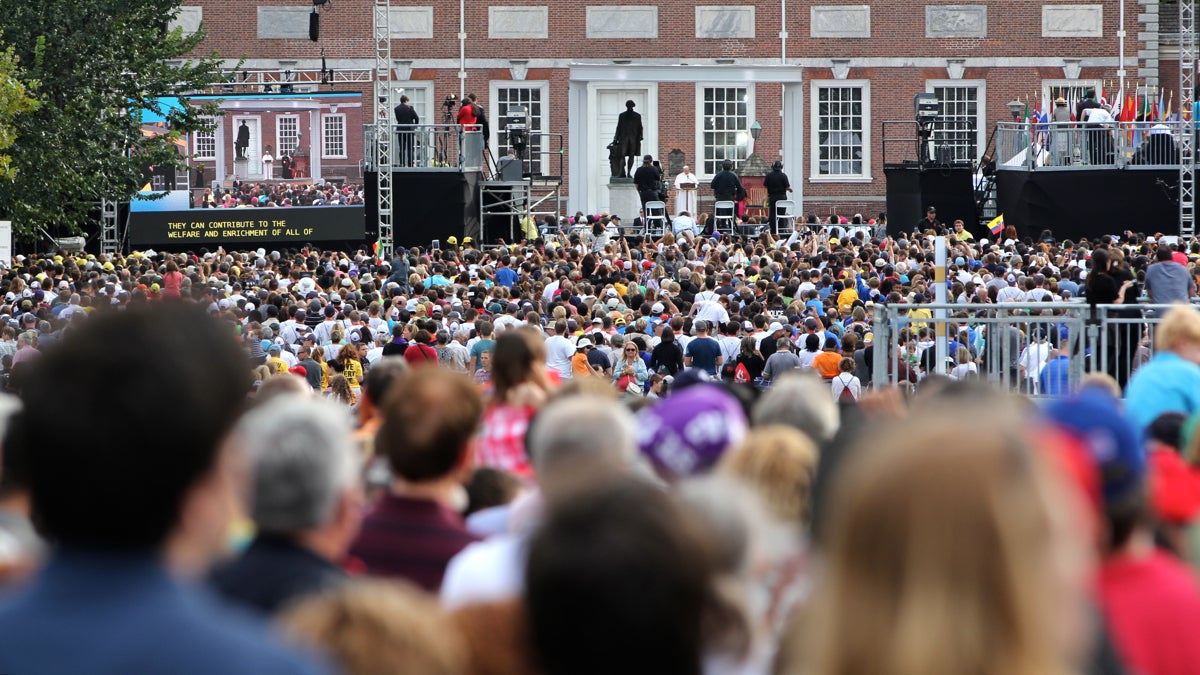Magna Carta’s birthday gift to America
Listen
The ideals expressed in the Declaration of Independence and the Bill of Rights have their foundation in the Magna Carta. (Emma Lee/WHYY)
A stone’s throw from WHYY lies Independence Hall, that glistening beacon of American liberty. These days, it’s cordoned off. Armed police patrol, a hangover from 9/11. It’s tough to picture that, here, nearly 240 years ago, rowdy colonists stirred up revolution.
Independence from Britain cost 25,000 American lives. In Washington Square, an inscription reads: “Freedom is a light for which many men have died in darkness.”
Not surprisingly, liberty is a big deal here — a sort of queenly deity. Americans like to imagine they invented her. But they did have a tiny bit of help.
Cue trumpet fanfare! Enter: Magna Carta!
Back in medieval Britain, justice was barbaric. Like plunging your hand into a scalding cauldron of water. If it didn’t blister and fall off, you were obviously innocent.
Villainous King John, of Robin Hood legend, ruled with an iron fist, driving Britain to the brink of civil war. In 1215, his angry barons rebelled, forcing John to negotiate at Runnymede, an island on the River Thames.
The King agreed to sign Magna Carta, curtailing his powers and bestowing fundamental rights on his people — the rule of law, access to justice and trial by jury.
Magna Carta became the cornerstone of Britain’s rather muddled constitution. Its most famous clause remains part of English law today:
“No free man shall be seized or imprisoned, or stripped of his rights or possessions, or outlawed or exiled, or deprived of his standing in any other way, nor will we proceed with force against him, or send others to do so, except by the lawful judgement of his equals or by the law of the land. To no one will we sell, to no one deny or delay right or justice.”
But before long, British monarchs forgot this sacred compact, and returned to plundering and filling their coffers. Which might explain why the American colonists decided to jump ship.
In a brick house on Philadelphia’s 7th Street, Thomas Jefferson penned the Declaration of Independence — a courageous act of treason against another overreaching king.
Today, Declaration House overlooks an uninspiring parking garage and a Dunkin’ Donuts. But Magna Carta endures in Jefferson’s “inalienable Rights” — “Life, Liberty, and the pursuit of Happiness.”
The blueprint for America’s founding documents, Magna Carta lurks in the Bill of Rights too, guaranteeing due process of law and trial by jury.
Jefferson loathed kingly tyranny. He’d turn in his Monticello grave, to see modern presidents flex their muscles, eroding his treasured separation of powers and civil liberties.
Think of the “War on Terror,” that troubled teenager, now nearly 14 years old. Liberty displaced by drone strikes and detainees in orange jump suits. The promises of Magna Carta seem to be missing in action.
But American tourists visiting Independence Hall impress me with their knowledge. These savvy patriots are happy chatting with a total stranger like me, about a crusty British charter they’ve never clapped eyes on. This is a people that knows its rights.
On her 800th birthday, perhaps this grand old lady, Magna Carta, is in safe hands after all.
—
Guest commentator Sophie Reid is a British journalist and lawyer living in Philadelphia.
WHYY is your source for fact-based, in-depth journalism and information. As a nonprofit organization, we rely on financial support from readers like you. Please give today.

